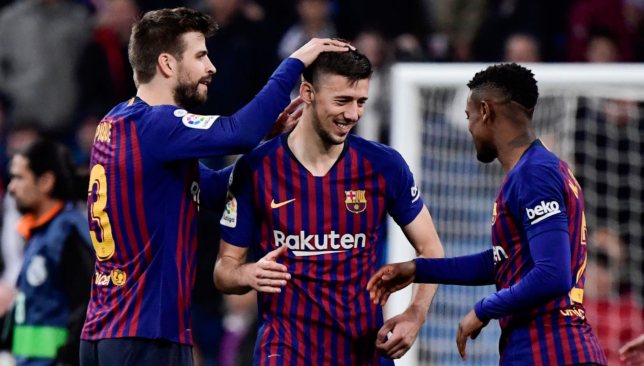
Although Lionel Messi’s outrageous goalscoring feats inevitably – and correctly – dominated the post-match conversation, another aspect of Barcelona’s 4-1 victory over Real Betis on Sunday night worthy of further consideration was the tactical set-up employed by the league leaders.
Some of the stats from the game caught the eye, to say the least: Betis controlled 56.1 percent of the possession, completing 581 passes compared to Barca’s 460. And the top six passers in the game were all Betis players, with William Carvalho (77), Marc Bartra (69), Sidnei (68), Andres Guardado (62), Aissa Mandi (60) and Sergio Canales (58) all managing more than Messi’s 57.
To put it mildly, being so heavily outnumbered in passing statistics is highly unusual for a Barca team which thrives on possession and has done so for years, but those numbers don’t tell the full story of the game and a more important stat is the fact that Barca had nine shots on target while Betis mustered just three. That suggests the passing stats didn’t pan out the way they did because Barca were outplayed, but because they wanted the game to unfold in exactly such a manner.
Of course, it’s not unusual to see Betis enjoy so much of the ball because Quique Setien’s team are well known for focusing intently upon retaining possession and weaving their way gradually towards goal with precise passing patterns – much like Barca themselves.
Not this time, though. Rather than trying to take on Betis at their own game, and risk getting burned in the way they did at the Camp Nou in November, Barca boss Ernesto Valverde instructed his players to perform in a different manner: sit back, defend with discipline, press only in certain areas and then strike with rapid thrusts when possession is regained.
In short, yes, Barca became a counter-attacking team.
Valverde deserves credit for plotting such a significant departure from his team’s usual playing style in such an effective way, and – if we allow our imagination to roam rather free – it’s easy to envisage how Barca could employ a similar strategy in a highly significant game a few weeks from now: a Champions League Final against Manchester City.
Of course, we’re jumping the gun a bit here. Barca and City have got to get past the quarter-finals and semi-finals first, and the collective powers of Manchester United, Liverpool, Tottenham and Juventus will be far from a pushover.
But the prospect of Pep Guardiola coaching against Messi and co in a Champions League Final is a highly enticing one, and Sunday’s win at Betis showed that Valverde might just be prepared to approach such a situation by allowing City to dominate possession, in the same way that he allowed Betis to dominate possession, before using the ruthless precision of Messi and Suarez on the break.
Sunday’s game showed that Valverde has complete trust in his defence to weather a serious amount of pressure. And that’s deservedly so, because Gerard Pique and Clement Lenglet have formed an outstanding central defensive partnership (it’s hard to see how Samuel Umtiti can get back into the team), while the only person in the world who appears not to regard Marc-Andre ter Stegen as an elite goalkeeper is his national team coach Joachim Low.
Those three provide a very solid backbone for Barca to defend well even with their backs against the wall, complemented by the selfless covering roles performed by Sergio Busquets and Ivan Rakitic, the endlessly intense pressing of Arturo Vidal and the cool ability of Arthur to play his way out of pressure.
This isn’t a revolution: Barca’s default mode is still to act as the main protagonists, spending as much of the game as possible inside the opposition half and greedily hogging possession. And that, no doubt, will be the way they continue to play in the majority of their upcoming big games – including, surely, the Champions League quarter-final against Manchester United.
But Sunday’s game was particularly interesting not just because it showed that Messi is a genius, which we already knew, but because we learned that Barca are also prepared, when necessary, to play a different kind of game, surrendering possession, trusting their defence to hold tight and killing their opponents on the break.
And if they do end up playing Manchester City in June’s end of season showpiece finale, that might be exactly the kind of game they need to play again.